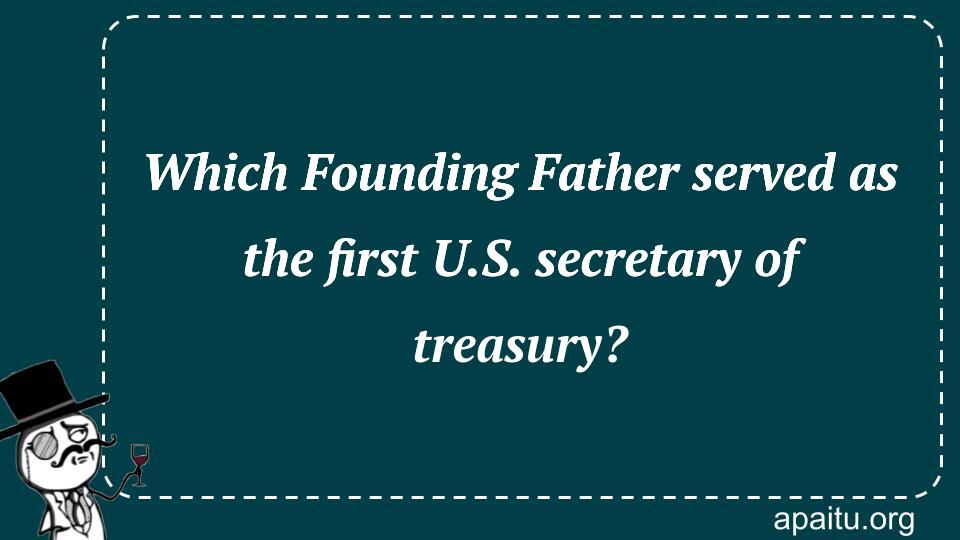Question
Here is the question : WHICH FOUNDING FATHER SERVED AS THE FIRST U.S. SECRETARY OF TREASURY?
Option
Here is the option for the question :
- Alexander Hamilton
- Thomas Jefferson
- John Jay
- Benedict Arnold
The Answer:
And, the answer for the the question is :
Explanation:
Alexander Hamilton has gained fame in recent years as the subject of Lin-Manuel Miranda’s successful musical ‘Hamilton,’ but Hamilton was an important founding father in non-Broadway history. As the first Secretary of the Treasury, he helped create early American financial policy and the separation of powers.

Unraveling History: Alexander Hamilton – The First U.S. Secretary of the Treasury
The Founding Fathers of the United States were instrumental in shaping the nation’s early years and establishing the foundations of its governance. Among these remarkable figures, Alexander Hamilton stands out as a key architect of American financial systems and policies. Join me as we delve into the life and legacy of Alexander Hamilton, the Founding Father who served as the first U.S. Secretary of the Treasury, leaving an indelible mark on the nation’s economic framework.
Born in 1755 or 1757 (the exact year remains a subject of debate), Alexander Hamilton was a visionary leader, an influential political thinker, and a staunch advocate for a strong federal government. His upbringing in the Caribbean and his experiences during the American Revolution shaped his perspective on the role of government and the importance of economic stability.
In 1789, George Washington, the first President of the United States, appointed Hamilton as the inaugural Secretary of the Treasury. This appointment marked the beginning of Hamilton’s transformative tenure, during which he would lay the groundwork for the nation’s economic future. Tasked with the immense responsibility of managing the nation’s finances, Hamilton faced numerous challenges, including war debts, a fragile economy, and the need to establish a stable system of taxation.
Hamilton’s accomplishments as Secretary of the Treasury were nothing short of revolutionary. He developed and implemented a comprehensive financial plan that included the assumption of state debts, the establishment of a national bank, and the creation of a currency system. Hamilton’s vision centered around bolstering the federal government’s authority over economic matters and promoting economic growth, trade, and industrialization.
One of Hamilton’s most significant contributions was his advocacy for the establishment of the First Bank of the United States in 1791. The bank served as a crucial institution for managing the nation’s finances, issuing currency, and facilitating economic stability. Hamilton believed that a strong central bank would provide stability to the banking system, encourage investment, and promote economic development. His vision laid the foundation for the modern banking system in the United States.
Hamilton’s financial plan also extended to the realm of taxation. He proposed the implementation of tariffs on imported goods to protect American industries and generate revenue for the government. Additionally, Hamilton advocated for an excise tax on domestically produced goods, such as whiskey, to further fund the federal government. These measures, while controversial at the time, contributed to the development of a sustainable revenue system that supported the nation’s growing needs.
Beyond his role as Secretary of the Treasury, Alexander Hamilton’s contributions to the nation were vast. His influence extended to the realms of law, politics, and diplomacy. He was a key author of the Federalist Papers, which played a critical role in advocating for the ratification of the United States Constitution. Hamilton’s legal acumen and persuasive writing style helped shape the interpretation of the Constitution and the principles of federalism.
Tragically, Alexander Hamilton’s life was cut short when he was fatally wounded in a duel with Vice President Aaron Burr in 1804. However, his lasting legacy as the first U.S. Secretary of the Treasury endures to this day. The economic systems and policies he championed laid the groundwork for the nation’s financial stability and prosperity. His vision for a strong federal government and a vibrant economy continues to shape the United States.
Alexander Hamilton’s tenure as the first U.S. Secretary of the Treasury left an indelible mark on American history. His financial plan, encompassing the establishment of a national bank, a stable currency system, and innovative taxation policies, set the stage for the nation’s economic growth. As we navigate the complexities of the modern financial landscape, let us remember the visionary leadership and enduring legacy of Alexander Hamilton, whose contributions continue to shape the United States’ economic framework.